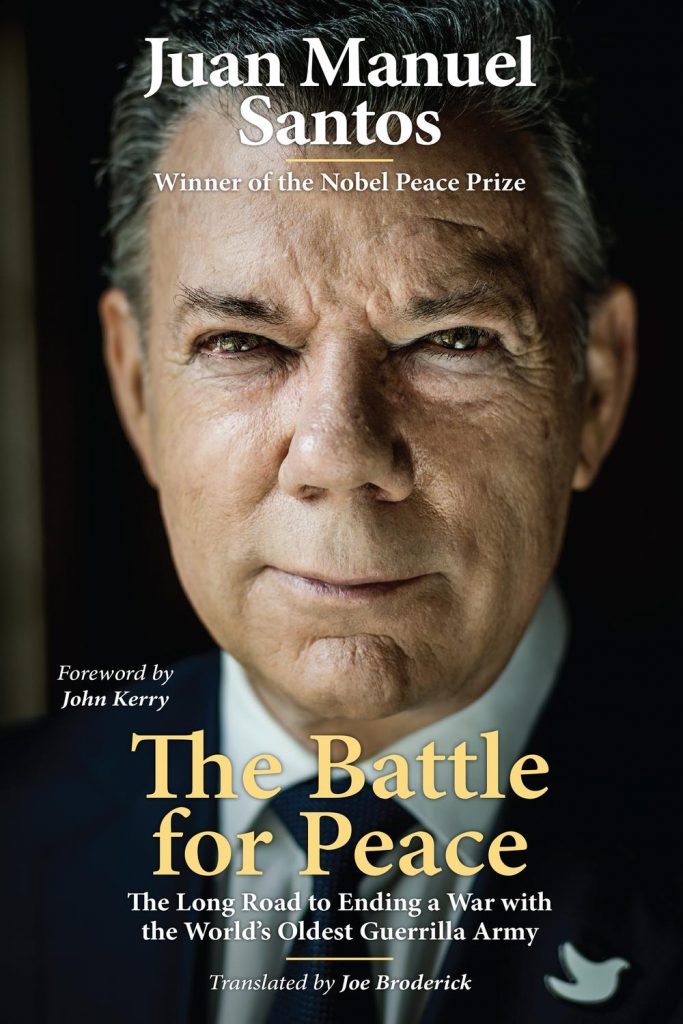Fulbright Chronicles, Volume 2, Number 2 (2023)
Author
Joe Foweraker

Juan Manuel Santos, The Battle for Peace: the Long Road to Ending a War with the World’s Oldest Guerrilla Army. Nobel Peace Prize Laureate Juan Manuel Santos was awarded the Fulbright-Fletcher Fellowship in 1981 and the Fulbright Excellence Award for Outstanding Alumni by the Fulbright Commission in Colombia in 2017.
This account, by Nobel Peace Prize laureate and the former president of Colombia, of the long search for a peaceful settlement to the armed conflict in Colombia is a heady mix of autobiography, history, memoir, political polemic, and instruction manual. After first exploring the historical background to the conflict, the story follows the series of failed attempts to reach an accord from the early 1980s to the early years of this century, before focussing on the crucial first six years of the Presidency of Juan Manuel Santos himself, and the successive stages of the prolonged negotiation between his government and the FARC (Fuerzas Armadas Revolucionarias de Colombia), the principal organization of the armed insurgents. At this point the narrative closely reflects an insider’s view of the process from the chief protagonist and lead architect of the settlement.
A heady mix of autobiography, history, memoir, political polemic, and instruction manual.
In fact, from the period of “conspiring for peace” (21) in the 1990s, this is always a personal history, its twists and turns mainly determined by the role of the author, who took an early lead in pursuing secret conversations and discrete contacts with both the guerrillas and the paramilitaries, to try to find a viable way forward. This was a risky and informal initiative by Santos and distinguished figures from civil society that was eventually discredited by the government. But the role became ever more prominent in the subsequent years of “creating the conditions for peace” (41) with Santos first serving as Finance Minister in the Pastrana administration (1998-2002) and then as Defense Minister during the presidency of Álvaro Uribe Vélez (2002-2010). In the latter role, Santos was at the forefront of the policy of waging war to make peace and strengthening the armed forces, especially their logistical and intelligence departments with financial and strategic support from the US under its Plan Colombia. There were military successes, above all in identifying and eliminating “high value” targets, and further success in demobilizing the paramilitaries, under the umbrella of the Law of Justice and Peace. But eventually, Santos came to doubt President Uribe’s commitment to a peaceful outcome, and this shaped his own approach when he was first elected President in 2010.
Almost inevitably, given the nature of the account, there are passages where the author seeks to defend his own moral stance or strategic approach, providing a measure of retrospective justification for his decisions. In compensation, he is always keen to recognize the essential support of political allies and professionals, both at home and abroad, in what was undeniably a collective enterprise that required discretion and loyalty; and Santos is at his most trenchant when delivering judgement on those deemed disloyal to the cause. The collective nature of the work becomes clear as the search for a solution enters the initial “secret phase” (103) from 2010 to 2012 that aims to bring the FARC to the negotiating table and establish the rules for the negotiations to follow. Once the pursuit of a negotiated peace settlement comes out into the open—and certainly by the time of Santos’s re-election to the presidency in 2014—this policy encounters considerable opposition, mainly from former President Uribe and his followers at home, and criticism from unsympathetic leaders abroad.
Here Santos’s political skills proved crucial in, firstly, bringing the presidents of Venezuela (Chávez) and Ecuador (Correa) onto his side, and, secondly, in winning a handsome electoral victory in the campaign for the presidency in 2014. In both instances, Santos took pride in finding common ground with opponents, despite ideological and political differences.
Santos understood that his government had to acknowledge the fact that it was engaged in an “armed conflict” with the FARC and was not simply seeking to suppress “terrorists.” This was a requirement of negotiating a peace settlement, as well as allowing the application of the Statute of Rome and international humanitarian law. (This apparently innocuous point of language highlighted the key difference between his approach and that of former President Uribe). And this was consistent with continuing to wage unrelenting war on the FARC, which succeeded in eliminating its principal military (Mono Jojoy) and political commanders (Alfonso Cano).
This dual and combined strategy ushered in the final phase of intense negotiations in Havana, with Santos always insisting that “nothing is agreed until everything is agreed.” It took six months just to agree on the agenda for the talks, and this was followed by fifty-one cycles of negotiation over four years–averaging eleven days each–- marked by ninety-four bulletins, three joint progress reports, and thirty- three joint minutes. The process was supported throughout by international advisers and guarantors and bolstered by the backing of everyone from US President Barack Obama to Pope Francis, and President Santos was awarded the Nobel Peace Prize in 2016 for his success.
This is a fascinating and important story. It may lack the discipline and objectivity of history, but it is replete with the passion of political engagement and debate. It is polemical in places, but remarkably generous in its judgements of political friends and political foes alike. Finally, beyond any doubt, it makes clear that it is far easier to wage war and wreak destruction than to work to secure peace, prosperity, and a measure of social justice. Santos makes a good case for combining the roles of warrior and peacemaker as a precondition for a successful search for peace; and perhaps this is especially true of the internecine strife that plagued Colombian society for so many years. But he also demonstrates that only extraordinary patience and perseverance can eventually get the job done.
Juan Manuel Santos, The Battle for Peace: the Long Road to Ending a War with the World’s Oldest Guerrilla Army. Lawrence, Kansas: University Press of Kansas, 2021. 424 pages. $23.00.
Biography

Joe Foweraker, a Visiting Fulbright Scholar to the University of Colorado (Boulder) in 1992, is an Emeritus Fellow of St. Antony’s College, University of Oxford and an Honorary Professor at the University of Exeter. He was Oxford’s first Professor of Latin American Politics and Head of its School of Interdisciplinary Area Studies; a visiting professor at the University of Para (Brazil) and the University of Florida; and a visiting research fellow at the Woodrow Wilson International Center for Scholars and the Center for US-Mexican Studies at the University of California (San Diego). His latest book is Oligarchy in the Americas: Comparing Oligarchic Rule in Latin America and the United States (2023) which was reviewed in Fulbright Chronicles in Vol 1, #4. He can be reached at books@fulbright-chronicles.com
